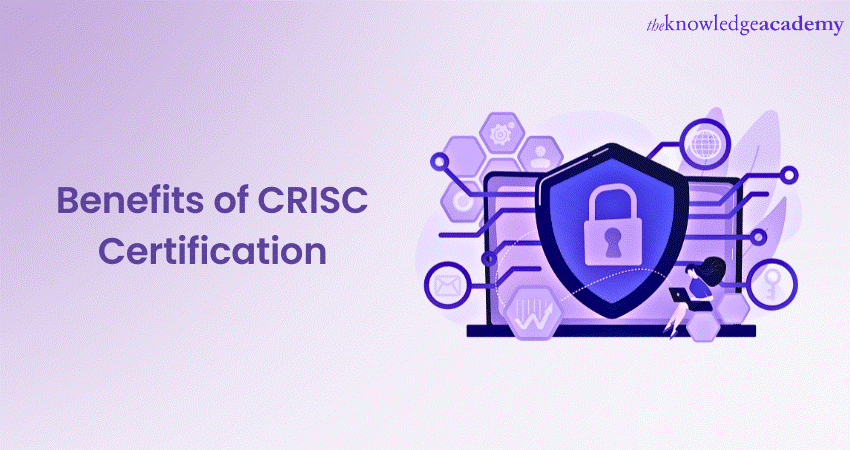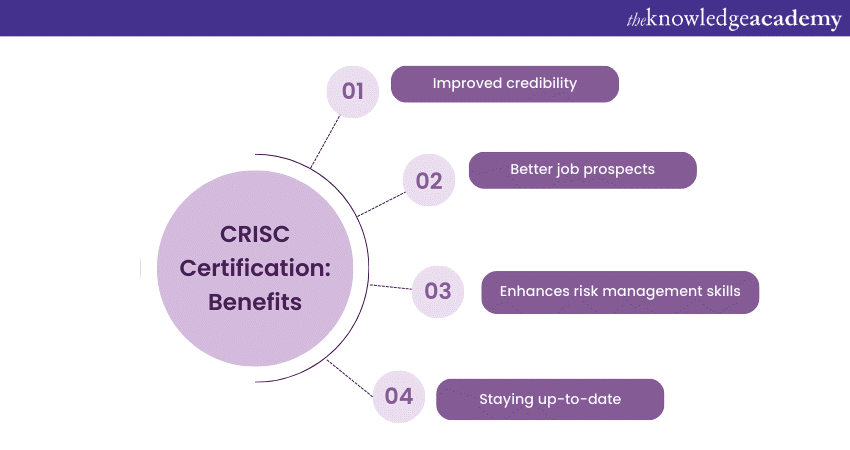We may not have the course you’re looking for. If you enquire or give us a call on +1 7204454674 and speak to our training experts, we may still be able to help with your training requirements.
Training Outcomes Within Your Budget!
We ensure quality, budget-alignment, and timely delivery by our expert instructors.

The Certified in Risk and Information Systems Control (CRISC) certification is among the most popular qualifications in the Information Technology (IT) industry. In a world where businesses are undergoing digitalisation, the scope for facing cyber threats is higher. Professionals who have secured certification of CRISC Benefits organisations of various industries and promote digital security.
According to Statista, around 70% of businesses have been affected by ransomware, weakening their security and putting confidential data at risk of being leaked. Thus, multiple organisations are on the lookout to hire CRISC-certified professionals. Read this blog to discover the numerous CRISC Benefits and take your IT career to new heights.
Table of Contents
1) Why is the CRISC certification important?
2) Benefits of the CRSIC certification
a) Improved credibility
b) Better job prospects
c) Enhances your risk management skills
d) Stay updated with an ISACA membership
3) Conclusion
Why is the CRISC certification important?
CRISC is one of the most significant certifications provided by the Information Systems Audit and Control Association (ISACA). The certification equips aspirants in the IT industry with the skills required to identify, assess, monitor, and respond to risks in businesses while implementing information system controls.
It is a globally recognised certification that leads you to high-paying jobs in popular organisations. The significance of the qualification rose as enterprises realised that CRISC-certified professionals are a good investment for maintaining cyber-security and improving their businesses.
Looking to crack your CRISC exams, refer to our blog on "CRISC Exam Questions"
Benefits of the CRISC certification

Acquiring a CRISC certification is a great addition to the resume of IT professionals looking for jobs in risk management for various reasons. Let's look at some of the benefits provided by CRISC certifications:
Improved credibility
Since CRISC is a globally acknowledged certification that shapes some of the best professionals in the IT field, it is highly valued by recruiters. Earning the qualification is a testament to an advanced understanding of the processes involved in risk assessment and response and controlling information systems.
Organisations prefer candidates with a CRISC certification as it signifies a commitment to quality work methods and skills that help in improving business performance. The primary skills they contribute to the company include effectively operating information system controls and recognising and mitigating risks.
Looking to crack the CRISC EXAM, refer to our blog on "CRISC Study Material"
Better job prospects
A CRISC certification can lead you to multiple valuable employment opportunities. The certification aims at helping individuals aspiring to pursue job roles like Risk Professional, Project Manager, Business Analyst, etc.
The certification has helped over 26,000 individuals attain high-paying jobs. Here is a list of jobs that can be achieved with a CRISC certification and their salaries:
|
Profession |
Roles and responsibilities |
Average salary |
|
Risk Manager |
a) Risk Managers are responsible for developing strategies to eliminate various business risks. b) They are also responsible for implementing information control systems to protect company data. data, and systems. |
£59,870 |
|
Security Engineer |
a) The primary responsibility of Security Engineers is responding to cyber-attacks to safeguard the computer systems of organisations. b) Overseeing and assessing security logs to check for potential data breaches or related problematic activity. |
£62,531 |
|
Chief Information Security Officer |
a) The Chief Information Security Officer (CISO) 's primary responsibility is maintaining an organisation's overall cyber security and risk mitigation policies. b) Monitoring incident response and engaging in disaster recovery planning |
£1,33,737 |
|
Chief Compliance Officer |
a) The Chief Information Security Officer (CISO) 's primary responsibility is maintaining an organisation's overall cyber security and risk mitigation policies. b) They work with Risk Managers to ensure that company policies align with regulatory compliance requirements. |
£58,929 |
|
Security Analyst |
a) The primary responsibility of Security Analysts is to conduct security assessments and internal and external audits. b) Detection of weak points in the virtual security wall of the company via methods like ethical hacking. |
£41,761 |
|
System Analyst |
a) Security Analysts' primary responsibility is conducting security assessments and internal and external audits. b) They sometimes work with Business Analysts, Project Leads, and IT teams to maximise the efficiency of their solutions. |
£36,270 |
Source: PayScale
Enhances your risk management skills
IT professionals seeking jobs in risk management are encouraged to acquire a CRISC certification to gain essential skills and improve their current skillset to contribute quality solutions to organisations.
The CRISC certification focuses on four domains which are as follows:
a) IT governance: This domain tests your knowledge about organisational and risk governance, organisational structure, policies, assets, etc.
b) IT risk assessment: This domain ensures you are proficient in IT risk identification, analysis, and evaluation. It also includes learning about threat modelling and landscape.
c) Risk response and reporting: This domain manages risk response plans, monitoring, reporting, and control design and implementation. This includes learning about third-party risk management and risk treatment plans.
d) Information technology and security: This domain ensures business practices align with risk management and security frameworks.
Here are some of the vital skills that CRISC-certified professionals portray:
a) Risk assessment skills
b) Management and control of information systems
c) Development of effective strategies to respond to and eliminate risks
d) Improved communication skills to convey complex topics to stakeholders and employees
Stay updated with an ISACA membership
The CRISC certification is provided by the Information Systems Audit and Control Association (ISACA). Acquiring an ISACA membership offers the opportunity to connect with like-minded industry professionals and learn and grow from them.
Being a part of the ISACA community also means getting access to helpful resources that help you stay updated with the latest improvements in the field. It also provides you access to the various certifications offered by them at a discounted price.
Acquire the skills required to conduct effective risk management and advance your career with our CRISC Training courses now!
Conclusion
The CRISC certification certainly opens multiple opportunities for aspirants in the IT industry and prepares professionals proficient in effective risk management. We hope you learned about CRISC and CRISC Benefits by reading this blog.
Upgrade your employment opportunities in the IT sector by signing up for our Certified In Risk And Information Systems Control (CRISC) course now!







 Top Rated Course
Top Rated Course



 If you wish to make any changes to your course, please
If you wish to make any changes to your course, please


